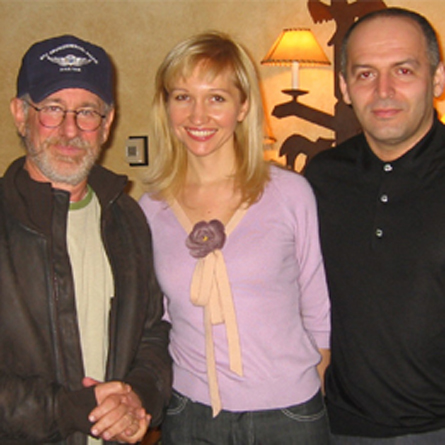Ukrainian Parliamentarian Viktor Pinchuk and Shoah Foundation to Collaborate on Documentary Film

Member of Ukrainian Parliament, Viktor Pinchuk, has made a generous contribution to support the production of a new documentary film that will rely upon the testimonies in the Shoah Foundation archive recorded in Ukraine. Mr. Pinchuk, who initiated the project, is the founder of Interpipe Scientific and Industrial Production Group. The 18-month project also includes the creation of a study guide for students and teachers that will be based on the film.
Pinchuk and Shoah Foundation Founder Steven Spielberg will be co-executive producers of the film, which will draw upon the more than 3,000 video testimonies of Holocaust survivors and witnesses collected by the Foundation in Ukraine. The Shoah Foundation has long wished to produce a documentary on the Holocaust in Ukraine, the site of the massacre at Babi Yar. When Viktor Pinchuk approached the Foundation hoping to collaborate in the production of a film about the Holocaust in Ukraine, the parties found that their goals matched perfectly and that Pinchuk’s idea was ideally suited to the resources of the Shoah Foundation.
Discussing Pinchuk’s vision of a film that would address both the massacre at Babi Yar and the larger story of the Holocaust in Ukraine, Spielberg said: “I am very grateful to Viktor Pinchuk for his support of the work of the Shoah Foundation and for his passionate desire to see the story of the Shoah in Ukraine told not only in his own country, but around the world. I join him in his belief that knowing about this dark chapter in Ukrainian past can help to build a stronger and more democratic Ukraine in the future.”
Pinchuk, who is active in philanthropy in Ukraine, Europe, and the United States, commented that "It is an honor for me to have the opportunity to support the work of the Shoah Foundation. Young people in Ukraine and throughout the world must see and hear the horrifying story of the Shoah in Ukraine from those who endured it, and they must see it and hear it not only in this generation but for generations to come."
According to Douglas Greenberg, Shoah Foundation president and CEO, “ The Shoah Foundation has a responsibility to return the testimonies it collected to the countries whose history they document. There is hardly a country in the world more important in this respect than Ukraine. A documentary film, focused on the life stories and experiences of survivors and witnesses in Ukraine will allow a broad range of audiences to hear these stories, and to learn the important lessons that history can teach through the unique and personal narratives of survivors and witnesses from their own country. We are grateful to Viktor Pinchuk for his vision in suggesting the project and his generosity in making it possible.”
Shoah Foundation in Ukraine
Between 1996 and 1999, in Ukraine, more than 3,400 Holocaust survivors and other witnesses gave testimony to the Shoah Foundation. Interviews were videotaped throughout Ukraine by local interviewers and videographers in a number of cities, including Kyiv, Odesa, and Dnipropretrovsk, as well as in Balta, Berdychiv, Cernivcy, Donetsk, Kharkov, Mogilev-Podolskii, Simferopol, Vinnytsia, Zaporizh’e, and Zhmerinka.
The Ukrainian collection mainly contains the experiences of Jewish survivors, but also includes Jehovah’s Witness survivors, Sinti and Roma survivors, liberators, rescuers and aid providers, and political prisoners. The majority of the interviews were conducted in the Russian language, as well as inEnglish, Hungarian, Polish, Romani, Ukrainian, and Yiddish.
The interviews show the very diverse experiences of witnesses in areas as different as Transnistria, Crimea, and Zakarpatska Oblast (Subcarpathian Ruthenia). Interviewees describe first-hand what they survived and how they managed to survive it. They discuss their involvement in resistance to the Holocaust. Many talk about the help that was given by non-Jews, and the archive also contains several interviews with Ukrainian aid givers. Additionally, the Shoah Foundation conducted numerous interviews in Ukrainian with Sinti and Roma survivors. The archive itself presents an incredibly rich and detailed picture not only of the Holocaust but also of life in Ukraine in the prewar and postwar periods.
Like this article? Get our e-newsletter.
Be the first to learn about new articles and personal stories like the one you've just read.